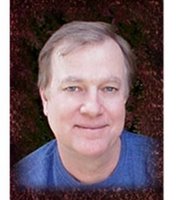JSB: How Easy!

I write suspense, so I’m constantly asking myself what I can do to make the reader turn the page. Is there any point at which the reader can say, "Well, I can put this down for a bit, and come back to it"? If there is, I cut it. Hitchcock’s Axiom is my guide. When asked what made a good story, the great director said, "It’s life, with the dull parts taken out."
More advice: Elmore Leonard, the famous crime novelist, said, "I try not to write the parts people skip."
It’s like Michelangelo’s remark about his famous statue of David. Someone asked him how he did it, how he fashioned this masterpiece from a big hunk of raw marble. "I saw David inside the marble," the artist said, "and chipped away all of it that WASN’T David."
Ah, simple rules. Surely all the masters of suspense writing agree on the rules.
Not so.
When I was learning how to write suspense, I read a lot of Dean Koontz. I also read his two "how to" books. Recently, I decided to re-read them both. They were waiting for me in the L.A. Library system: Writing Popular Fiction, written in 1972 when Koontz was a pup of 26; and How to Write Best Selling Fiction (1981), in which he contradicts some of his own earlier advice (admittedly so).
In the latter volume, Koontz emphatically states:
"DON'T start writing a novel until you know how to solve the hero's problems. You don't want to get to the end of a long manuscript only to discover that you have no idea at all how to get your hero out of the mess into which you have put him."
That didn’t sound like the same advice given by Stephen King. So I pulled his On Writing off the shelf, and turned to this:
"[I]f I'm not able to guess with any accuracy how the thing is going to turn out, even with my inside knowledge of coming events, I can be pretty sure of keeping the reader in a state of page-turning anxiety. And why worry about the ending anyway? Why be such a control freak? Sooner or later every story comes out SOMEWHERE."
Ha! Two masters, two distinctly different philosophies. Which only goes to illustrate that there's no one right way to do it.
What course ought you to follow then? The old reliable--trial and error. Find out what works for you, and then tell your story.
Do that, and it’s all sunshine and flowers from there, right? That cocky 26-year-old Koontz might have believed that. Here's a bit of advice from his 1972 book, answering a question on how long it takes to get financially secure as a full time writer:
"With a top-flight agent (and there are very few of them) and a willingness to try other categories, to go where the money is the best and the audience the largest, you can achieve an income of $50,000 a year and up with half a dozen novels per annum."
See how easy it is? Only six novels a year!
James Scott Bell, http://www.jamesscottbell.com, is the author of Write Great Fiction: Plot & Structure (Writers Digest Books).



6 Comments:
So true....as writers, I think we read all the "how-to" writing books and try to take ALL the advice, when really, we should only take what works for US! Thanks for sharing!
Admittedly, I haven't read many writing books, but I had to read Stephen King's for one of my classes this year, and thoroughly enjoyed it. Some great advice in there for writers, but also for editors (hopefully me someday!)
Love your points here. Sometimes we can get so caught up in the process that we forget why we're there. Writing takes a lot of work...and faith.
I love your book. I've read it over and over. my favorite part is the bullseye(The force field of Character change) That's what I'm trying to master!
Thanks all, for the comments. Bonnie, I'm glad you like the book. That "force field" is something I used to teach trial lawyers, so they could understand jurors better. Little did I know that later it would come in so handy for character work. See, a lawyer is good for SOMETHING.
Yeah, just 6 books. No prob. Well, maybe for Robin.
I already know what my method is. I'm such a control freak, I'd never be able to write a book without knowing what color underpants the hero has on.
Camy
Post a Comment
<< Home